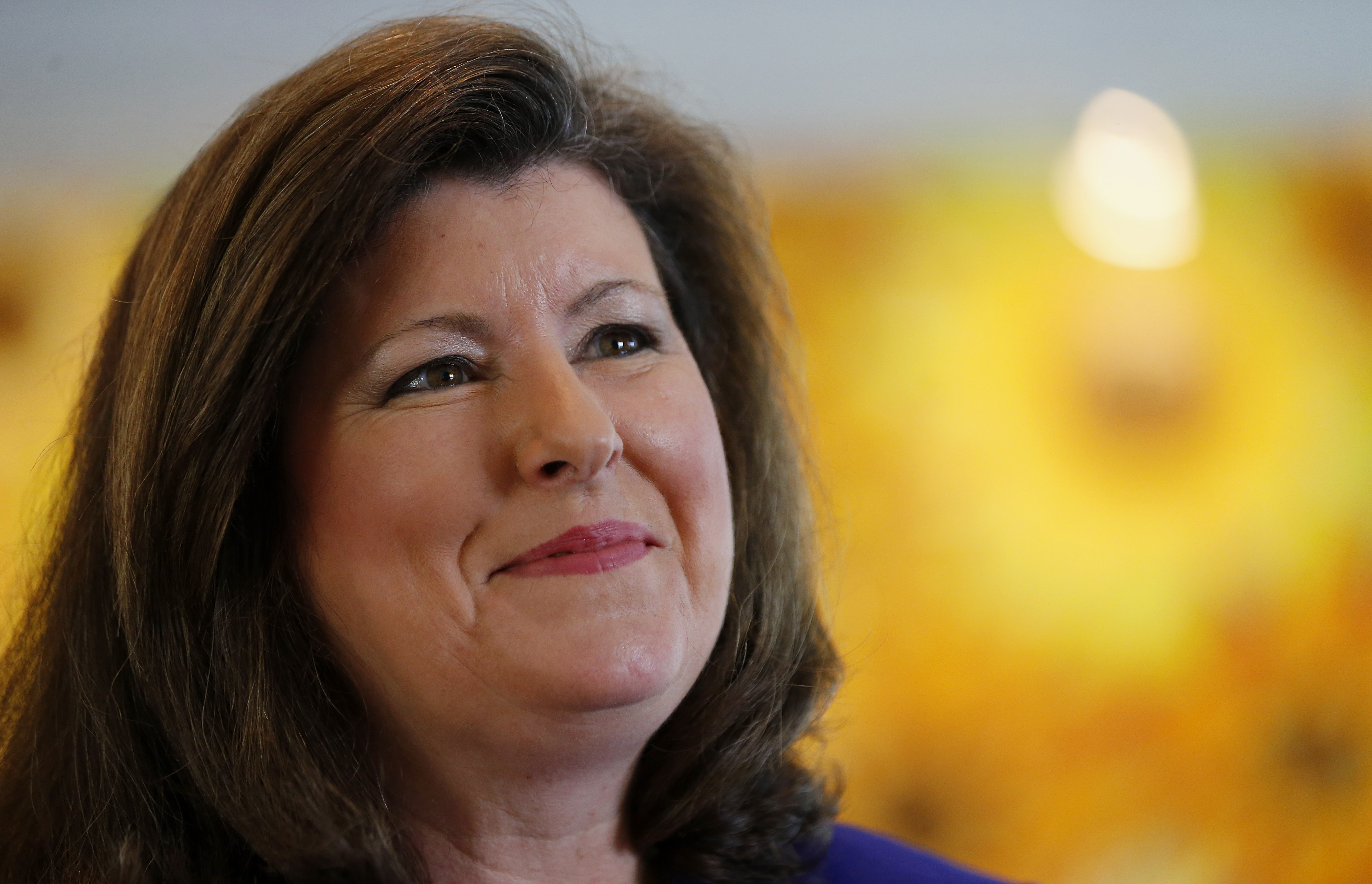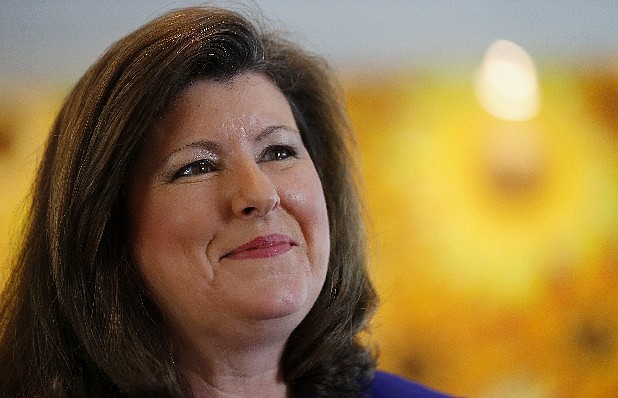Senate hopefuls claim 'business' label in Georgia
Saturday, May 17, 2014
 Georgia Republican Senate candidate Karen Handel speaks to a reporter during a campaign stop in Roswell, Ga. Candidates in the fiercely-contested Georgia GOP primary are claiming the pro-business mantle as they chase voters suspicious of government. Rep. Jack Kingston is flying his U.S. Chamber of Commerce endorsement like a flag, claiming it's proof of his loyalty to the private sector. Rep. Paul Broun says the backing proves Kingston would be a rubber stamp for the Washington establishment. Businessman David Perdue, meanwhile, has built his entire campaign on convincing voters to elect a former corporate CEO over several long-time politicians. And Karen Handel likes to tell voters of her time running one of the state's larger chambers of commerce. In all, seven candidates are vying for the GOP nomination on Tuesday and the right to compete for the open seat against Democrat Michelle Nunn in November.
Georgia Republican Senate candidate Karen Handel speaks to a reporter during a campaign stop in Roswell, Ga. Candidates in the fiercely-contested Georgia GOP primary are claiming the pro-business mantle as they chase voters suspicious of government. Rep. Jack Kingston is flying his U.S. Chamber of Commerce endorsement like a flag, claiming it's proof of his loyalty to the private sector. Rep. Paul Broun says the backing proves Kingston would be a rubber stamp for the Washington establishment. Businessman David Perdue, meanwhile, has built his entire campaign on convincing voters to elect a former corporate CEO over several long-time politicians. And Karen Handel likes to tell voters of her time running one of the state's larger chambers of commerce. In all, seven candidates are vying for the GOP nomination on Tuesday and the right to compete for the open seat against Democrat Michelle Nunn in November.ATLANTA - The leading candidates in Georgia's crowded Republican Senate primary are all claiming the pro-business mantle as they battle each other and chase conservative voters.
One of the front-runners, Rep. Jack Kingston of Savannah, pitches his U.S. Chamber of Commerce endorsement as proof of his commitment to the private sector, despite two decades on Capitol Hill. But another contender, wealthy businessman David Perdue, hangs his entire campaign on the argument that voters should elect a former corporate CEO instead of politicians like Kingston, former Georgia Secretary of State Karen Handel or two other congressmen: Paul Broun and Phil Gingrey.
Handel tells her own private sector story, anchored by a brief stint running a local chamber of commerce in Georgia's largest county. Gingrey, a six-term congressman, and Broun, who was elected in 2007, tout their work running private physician practices at various points in their careers.
It's a key dynamic in one of the country's most closely watched and fiercely fought election-year contests, which will help decide which party controls the Senate for the final two years of President Barack Obama's tenure in the White House.
Next Tuesday's seven-candidate GOP primary is certain send the top two vote finishers to a July 22 runoff, and the eventual nominee will almost certainly face Democratic favorite Michelle Nunn in November. A victory for Nunn, the daughter of former longtime Sen. Sam Nunn, would hand Democrats a once-unlikely pickup of retiring Republican Saxby Chambliss' seat and dent GOP hopes of reaching the national six-seat gain needed for a majority.
But angling for the business mantle comes with risks in a race where runoff spots could come down to a few thousand votes.
Many verbal attacks are leveled at Perdue, who has spent at least $2.1 million of his own fortune on the primary. He drew criticism this week for telling a Georgia newspaper that solving the nation's budget woes would take spending cuts and revenue increases. That sounded to some like "raising taxes."
"I was never able to turn around a company just by cutting spending," he explained to The Macon Telegraph, adding that "there's five people in the Senate" -- those who came out of business -- "who understand what I just said."
Handel quickly called Perdue a liberal -- and she had already repeatedly mocked him as a "millionaire elitist" after he suggested she wasn't qualified without having a college degree. Broun said Perdue was "so moderate he makes Saxby Chambliss look like the head of the tea party."
The flap prompted FreedomWorks, a national conservative group that had previously not endorsed in the Georgia race, to urge voters to nominate anyone but Perdue.
Kingston also accuses Perdue of overselling his business experience. "If someone's business record is so good and so complete, perhaps they're concerned about some of the shady business dealings and some of the layoffs and some of the golden parachutes," Kingston said at a recent debate.
He was referring to Pillowtex, a North Carolina textile firm that Perdue took over in 2002 after the company had recently emerged from bankruptcy. Perdue stayed eight months, and the firm closed three months after he left, with some 7,650 people losing their jobs across the country.
When questioned, Perdue cites unmanageable pension liabilities as the reason he couldn't rescue the firm, and he says he's been willing to take risks in business. But on the campaign trial, he usually leaves out any Pillowtex reference, instead focusing most heavily on his more successful tenures at Reebok and Dollar General.
Kingston, meanwhile, has had to defend his Chamber endorsement, even from rivals who had sought the political titan's seal of approval. Broun says the Chamber backing proves Kingston would be a rubber stamp for "the establishment."
Kingston called that "sour grapes" from a rival who could use the $920,000-plus in advertising and campaign support the Chamber has steered to help him.
The Chamber's involvement is part of the organization's push to influence Republican primaries and stifle the influence of tea party groups and similarly aligned organizations that helped elect conservative senators like Ted Cruz of Texas and Mike Lee of Utah. Those senators led the charge against raising the nation's debt ceiling last fall, a position at odds with the Chamber.
The group endorsed Kingston despite the fact that he and his House Republican colleagues -- including Broun and Gingrey -- followed Cruz's and Lee's lead on the debt limit. Kingston and his Georgia colleagues also oppose an immigration overhaul that the Chamber supports.
